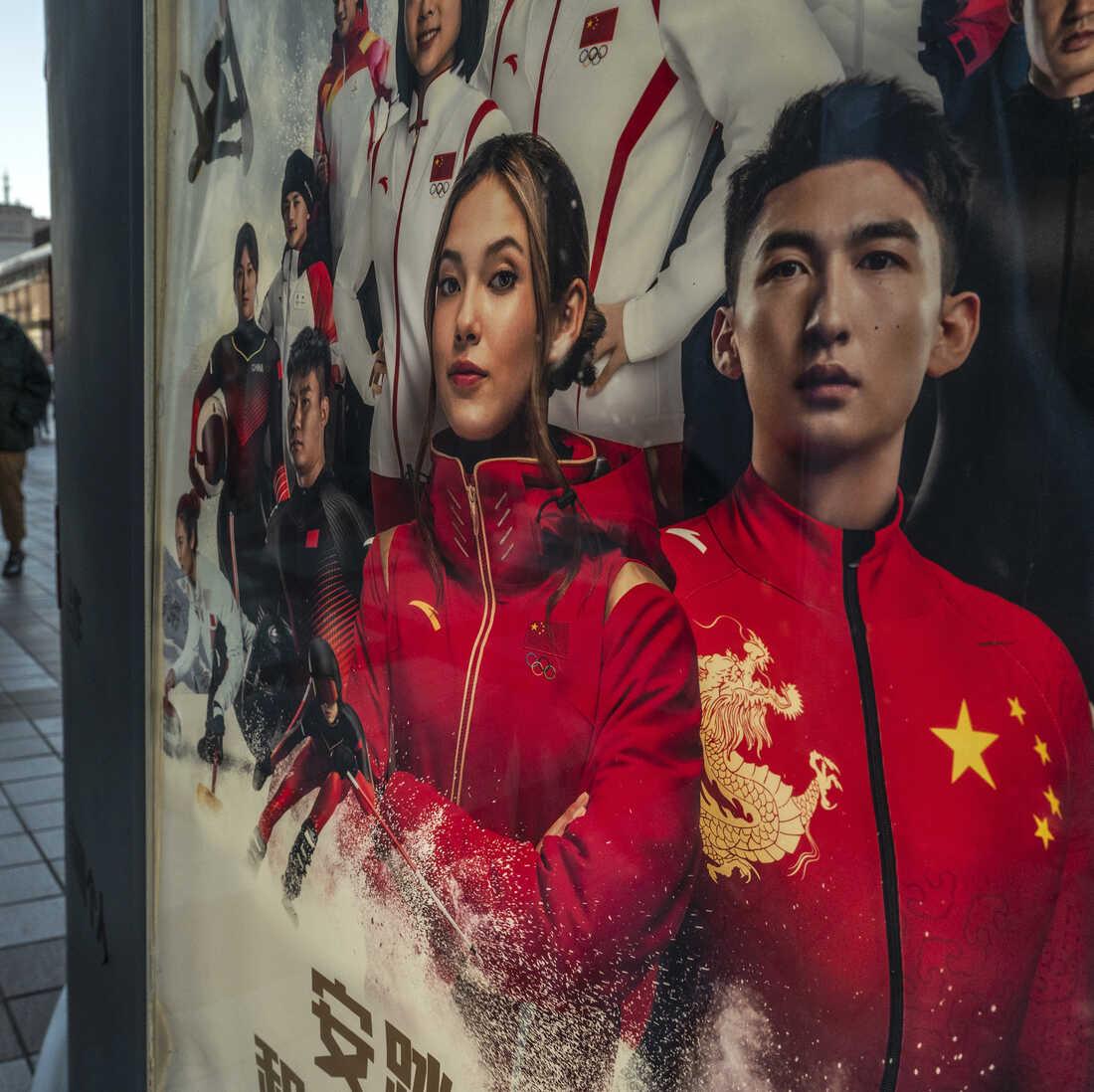Chinese nationality
« previous post | next post »
[This is a guest post by Bob Ramsey]

Eileen Gu is the face of at least 23 brands in China
She Made $31.4 Million in Endorsement Deals Last Year

Eileen Gu in a Sportswear Ad on a Beijing Billboard
Olympic gold medalist Eileen Gu has created controversy around the meaning of nationality. “I’m American when I’m in the U.S. and I’m Chinese when I’m in China,” Gu told reporters.
As the child of a Chinese mother and a white American father, Gu is biracial. And since she was born in San Francisco but competes for Team China, she could be described as having dual nationality. But that’s not something that's allowed in China.
China has a strict ban on dual nationality that goes back to the late imperial period, when, in 1909, Qing Dynasty (1644-1912) officials enacted a ruling known as the “bloodline principle”— that is, the idea that citizenship is based on ancestry and not where you were born. In this way, the Qing government laid claim to ethnic Chinese living overseas to ensure their allegiance. In the end, that ploy didn’t matter much, because, just two years later, a revolution ended imperial rule in China. Nevertheless, the bloodline principle endured.
In 1950, the People’s Republic of China extended citizenship beyond Han Chinese to everyone living in China. That meaning of citizenship was, at least in a pro forma way, still in effect at the Beijing Olympics, when minority representatives participated in the opening ceremonies—including a young Uyghur woman who helped light the Olympic flame. But this change was only a minor fillip of birthright citizenship added onto the basic definition of nationality, which remained the bloodline principle reserved for Han Chinese.
In 2020, to ease limits of citizenship, China loosened requirements for permanent residency status–Beijing’s version of a green card. Through this status, a foreigner with demonstrated talents can live and work in China, and athletes granted such status can play for Chinese national teams. In this way, China recruited players from the U.S. and Canada for its hockey teams, including four athletes who have no Chinese ancestry at all. Altogether, three-fourths of China’s Olympic athletes were in fact born in North America or Russia.
Whether such changes will ever broaden the idea of who is Chinese remains to be seen. But for now, a biracial person like Eileen Gu remains popular and successful—as long as she wins medals.
Selected readings
- "'Tigger Chen' and 'Instant Noodle Sister'" (2/15/22)
- "Taiwan's gold medalist with an unusual name" (7/29/21)
- "Hockey language divergence between North Korea and South Korea" (2/11/18)
- "Remarks on the slogan for the Beijing Olympics"
- "Ad hoc Romanization for Mandarin: 2022 Winter Olympics" (9/30/19)
- "China's 2022 Olympic mascots have unusual names", by Qin Chen, inkstone (9/18/19; updated 9/19/19)
- "Renewal of the race / nation" (6/24/17)
- "Born in Translation: 'China' in the Making of 'Zhongguo'"
Martin said,
February 21, 2022 @ 12:27 am
I object to the last word here: "Gu is biracial."
One may say that she is binational and/or biethnic, but no one is biracial. There is only one human "race" now, Homo sapiens sapiens.
PJB said,
February 21, 2022 @ 2:23 am
What's omitted here, or perhaps merely alluded to by necessity, is that if China has a strict no dual nationality policy, then Ms Gu must have renounced her US citizenship, in which case, no matter how she she identifies, she is not, in fact, American in America, she is a Communist Chinese national, by choice, and represents all that that entails.
John Swindle said,
February 21, 2022 @ 4:34 am
@PJB: Ms Gu may indeed have chosen Chinese citizenship over American citizenship. That’s probably the least likely scenario. She may be a dual citizen with China ignoring her American citizenship. She may have two nationalities until some cutoff age. Or she may be a US citizen with a Chinese residence permit as Victor described. It may be none of our business. She is a young person from California who plans to go to Stanford in the fall and meanwhile has had a remarkable opportunity to excel at a previously unknown sport, promote international friendship, and make a pile of money.
Philip Taylor said,
February 21, 2022 @ 7:05 am
PJB — why a Communist Chinese national ? What has communism (or capitalism, or any other -ism) to do with the issue of her nationality ? And why does she "represent" anything other than the country on whose behalf she chose to compete ? Leave politics out of sport, please — they have no place there.
Philip Taylor said,
February 21, 2022 @ 7:10 am
[Orthography of prosodic focus] — why the inconsistent capitalisation of "Eileen Gu is the face of at least 23 brands in China
She Made $31.4 Million in Endorsement Deals Last Year"?
The first sentence (which lacks a final period) seems fine; the second sentence shrieks "In Your Face". I could (just about) live with "She made $31.4 million in Endorsement Deals last year", but find the title-casing of "Made", in particular, totally ridiculous.
Philip Taylor said,
February 21, 2022 @ 7:15 am
Oops, forgot to render the Mathjax handler temporarily impotent — the above should have read :
Andrew Usher said,
February 21, 2022 @ 8:17 am
Philip Taylor, I can't figure out your last post. Was it intended for the thread 'Orthography of prosodic focus'? And while I hope we'd all prefer to leave politics out of sport, in high-profile cases like this it is always present.
I don't think anyone is criticising Ms. Gu's decisions (whatever they were); if there's anything to criticise it's the corrupt system of international sport, that permits countries to bend the rules to allow athletes to represent their country, rather than forcing them to use the same (citizenship/residency) rules as for everyone else. It reminds one of US universities, which everyone knows bend the rules as much as they can for certain athletes that would not ordinarily be eligible for admission. In both cases it turns me off from the sports in question.
It is most likely that she has not done anything to affect her American citizenship and considers herself at least as American as the average Chinese-American does; she's doing it for the money and perhaps the sport, which oddly is not mentioned here: just what sport does she compete in?
Finally, 'biracial' is not my favorite word, either, but it's become part of the language and disputing its correctness is just silly.
k_over_hbarc at yahoo.com
Brett said,
February 21, 2022 @ 8:28 am
@PJB: Journalists have looked into this issue, and it turns out that the PRC's policy on dual citizenship is not actually so "strict" when it comes to celebrities and world-class athletes. Athletes of Chinese ancestry who express interest in competing for the PRC are told—whatever the official policy says—not to worry about disclaiming their other citizenship(s). In Gu's case, she has almost certainly not gone through the steps and expense of disclaiming her American nationality in front of a consular officer.
Philip Taylor said,
February 21, 2022 @ 9:13 am
Andrew — It was simply a cross-reference : an instance of "Orthography of prosodic focus" (the topic of another thread) in the present thread.
Rodger C said,
February 21, 2022 @ 10:24 am
Philip, to an American, Communist China is the name of a country, to be distinguished from Nationalist China.
John Tkacik said,
February 21, 2022 @ 12:56 pm
Foreign seafaring communities populated Tang Dynasty seaports as early as the seventh century a.d. The Imperial Law Code of the Tang made provisions for them to govern themselves. In fact, the term “persons from beyond the pale of civilization” is first recorded in the “Tang Code”, “reflecting the prejudices of the ruling class and referring to those places not reached by Chinese education and culture.” Section 6 of the Tang Code specified that “Those of the same race who are persons from beyond the pale of civilization, when they commit offenses against each other, shall be dealt with according to their own customs and laws.”“(化外” 舊時統治階級的偏見, 指中國教化達不到的地方。 唐律疏義名列六: “諸化外人同類自相犯者,各依本俗法.) See Dictionary of Etymology 辭源合訂本,Commercial Press 商務印書館, Beijing 1989, p. 210.3
Victor Mair said,
February 21, 2022 @ 1:05 pm
From Bob Ramsey:
Re. this business of dual citizenship: There's no need to stew over whether Eileen Gu has given up her American citizenship. I don't mean to be too cynical, but China is not a country where the rule of law consistently trumps other considerations. After all, many of us remember that Huawei heiress Meng Wanzhou was found to be in possession of as many as seven passports in 2018. We know China regularly extends perks and privileges to a select few, so it's likely that an exception was made for Gu because she serves China’s national interest.
Jerry Packard said,
February 21, 2022 @ 4:36 pm
A person from China will typically euphemistically say (in Chinese) 'I carry an American passport' to skirt the issue.
John Swindle said,
February 22, 2022 @ 3:30 am
Rodger C said, “… to an American, Communist China is the name of a country, to be distinguished from Nationalist China.”
Yes, PJB will have meant “a [Communist Chinese] national” and not “a [Communist] Chinese national.” I would however argue that “Communist China” as the name of a country is not neutral but pejorative in American usage, despite (or perhaps as evidenced by) its use by Fox News.
Phil H said,
February 22, 2022 @ 12:55 pm
On the green card: you don’t need a lot of talent, but you do have to be here for a long time. I got one with a very scant professional record, mainly because I married a Chinese person and lived here in a law-abiding way for more than a decade.
Jeff DeMarco said,
February 23, 2022 @ 1:01 am
I believe the issue here is that the Olympics rules require citizenship in the country for whom the athletes compete. It’s not a problem most of the time, as most countries allow dual citizenship. In this case someone was bending the rules.
Andrew Usher said,
February 23, 2022 @ 11:00 pm
Yes, and my point is this bending the rules for top athletes is not just a Chinese thing – and it's not done for the benefit of the athlete. Granting dual citizenship is functionally the same thing, one should see.
The use for 'Communist China' is contrast to 'Nationalist China' is extremely dates, I would say. It's liable to look like political bias even if not intended as such.
B.Ma said,
February 26, 2022 @ 3:50 pm
Meng Wanzhou had 7 passports, but they were all passports of the PRC (some of them being plain PRC passports and others being PRC-HK passports).
PRC-HK citizens who possess a Hong Kong birth certificate are explicitly permitted to hold foreign nationalities, but these are not recognized in the PRC (including HK). (My father was born in HK but does not possess an HK birth certificate, and as he acquired another citizenship before 1997, he was not able to obtain a PRC-HK passport after 1997.)
It is possible to possess both US and PRC citizenships, as my cousin married someone whose family is connected to the CCP and all of them are citizens of the PRC and a Western country, as in their PRC citizenship was not removed by the CCP when they moved abroad and met the requirements to naturalize in the Western country.